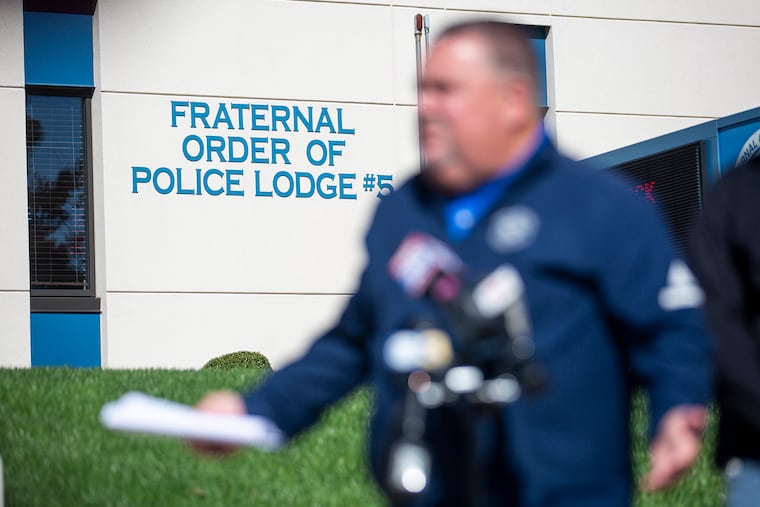Philly police contract fight is on: FOP seeks 5% ‘accountability’ bonus for body cam use
“If what the FOP is requesting is more money because they will be more accountable, that’s outrageous,” POWER’s Rev. Mark Tyler said.

A 5% “accountability pay” boost for wearing body cameras. A 5% residency differential for living within city limits. A $2,400 annual clothing and maintenance allowance. Triple overtime for appearing in court for two consecutive days an officer would normally have off.
These are some of the demands the Fraternal Order of Police Lodge 5 has put forward for the next Philadelphia Police Department contract — an agreement that has drawn elevated public scrutiny after last year’s protests calling to “defund the police.” After City Council resolved to hold a hearing on the contract last year, the FOP sued to stop it. The hearing, in November, lasted more than seven hours and drew nearly 100 speakers.
The city has proposed its own contract changes, including a push to require officers live in the city; rules limiting back pay or reinstatement for officers who are fired or disciplined; and a new performance management system. One notable change would bar arbitrators from overturning discipline for “proven” misconduct. Another would permit the department to freely transfer anyone who can no longer fulfill police duties, or demote them to a civilian post. And still another would let the department unilaterally set procedures for the board that handles police discipline.
A city spokesperson emphasized that the proposal is just a draft but that the changes “would be critical in terms of improved accountability for wrongdoing.”
Reform advocates saw the city’s pitch as a good first step. But some said the measures do not reflect the urgency that led them to march last summer and fall — and to seek a ballot measure installing a new police oversight commission, which passed with 79% approval in November.
“The disciplinary process is deeply flawed,” said the Rev. Mark Tyler, who leads Mother Bethel AME Church and is codirector of POWER’s Live Free campaign. “For advocates, the entire disciplinary process needs to be thrown out and we need to start all over again.”
As for the FOP proposal, Tyler was dismayed at the idea of “accountability pay” for wearing body cameras. “If what the FOP is requesting is more money because they will be more accountable, that’s outrageous,” he said.
FOP president John McNesby declined to comment, saying, “We don’t discuss what we’re doing in the papers about our contract.”
Charles Katz, director of Arizona State University’s Center for Violence Prevention and Community Safety and an expert on body-worn cameras, said it’s not unprecedented for police to tie a pay increase to body camera implementation: Las Vegas Metro Police did so. But it’s not typical, he said, since using body-worn cameras “is now the standard of care being practiced by police officers across the nation.”
Research has shown police benefit from the technology. “Now many police officers argue they won’t go out on the street without body-worn cameras,” he said. “They want that as evidence they are doing the job right.”
The evidence is hazier about residency requirements. The FOP wants a 5% pay increase for officers who live in the city. The city’s proposal would simply require a Philadelphia residence for officers hired in the last several years, and ban those who live in the suburbs from taking police vehicles home.
“That is one of those reform measures that sounds really good,” said Michael Jenkins, who heads the University of Scranton’s Center for the Analysis and Prevention of Crime. But, he said, research has not proven it improves the quality of policing.
To John Hollway, of University of Pennsylvania’s Quattrone Center for Fair Administration of Justice, the disciplinary reforms proposed are helpful. But, he warned, eliminating arbitration may be only part of the solution.
“If arbitration was where people fought before, maybe now they’ll fight upstream,” he said. “Giving more ability to the department to remove officers who clearly shouldn’t be on the job is a good thing, but it doesn’t mean that one change is going to all of a sudden solve every problem.”
Some of those could be addressed by the Police Oversight Board, once it is established. City Councilmember Curtis Jones last week introduced legislation for a civilian body with subpoena powers and a mandate for transparency.
Tyler said he would like to see the board be staffed by full-time elected officials, a proposal he acknowledged would cost more than $20 million.
“We believe that should not be new money, but that money should come directly from the Police Department’s existing budget,” he said. “The citizens should not be held responsible for the lack of accountability.”